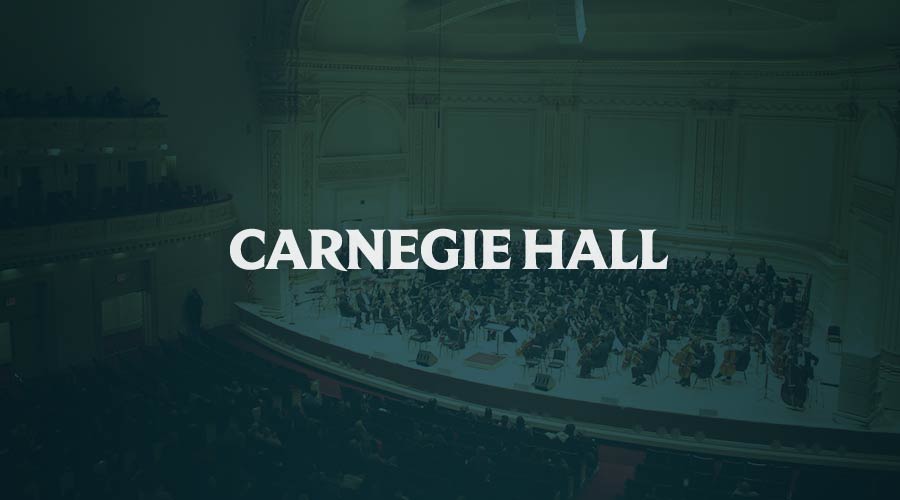This week, Carnegie Hall announced its 2021-2022 lineup, which features a broad range of voices and musical talent and promises to bring listeners to “bold new musical worlds.” According to the Carnegie Hall announcement, the lineup will feature Perspectives artists, returning favorites as well as “the world’s finest orchestras and recitalists; a visionary journey to the world of Afrofuturism; and so much more.” The 2021 season will begin this October.
Carnegie Hall is one of the nation’s oldest live music halls, with an international reputation for musical excellence. Since opening its doors in 1891, Carnegie Hall has welcomed artists of every genre, from Tchaikovsky to Billie Holiday to The Beatles.
In 2019, Robert F. Smith was elected as Chairman of Carnegie Hall’s Board of Trustees after serving as a trustee since 2013, becoming the first African-American person to serve in this position. Upon accepting the position, he said “Carnegie Hall is perfectly placed to champion not only artistic excellence, but also access and exposure to the best music in the world.” He went on to say that he would continue to expand “outreach efforts into communities to reach our next generation of music lovers and performers.”
Carnegie Hall has launched several online initiatives to try to reach new audiences. In December 2020, Carnegie Hall, like many venues, went virtual to bring music to fans while live in-person performances were on hold. The concert was named “Music is Medicine” and celebrated America’s frontline health care workers and created a platform for them to showcase their musical talents. The show also included appearances by violinist Joshua Bell, as well as several other celebrated musicians.
Celebrating Diversity with The Sphinx Organization
The Concert Hall’s in-person return this October will be headlined by a diverse group of talented musicians. On October 15, the Sphinx Virtuosi, a renowned chamber orchestra, will play Carnegie Hall. The ensemble hails from Detroit and their music aims to inform listeners about important social issues like racial violence. When reviewing their previous performance at Carnegie Hall, the New York Concert Review said Sphinx Virtuosi’s performances have the “vital energy of a life-and-death mission.”
The ensemble was convened by the Sphinx Organization, a group Robert F. Smith works closely with. Their mission is to expand diversity in the arts, specifically classical music. Today, the Sphinx Organization has a full orchestra comprised of 18 top Black and Latino classical soloists that performs all across the country. The organization also provides music training to students of all ages, and runs many performance groups and full-scholarship summer programs. These performance groups have a focus on cultural diversity and are open to students aged 11-17. Robert F. Smith has supported the Sphinx Organization in many ways over the years, including donating $250,000 to the group to create the Robert Frederick Smith Prize, which is awarded annually to winners in the Senior Division.
Another performer on the 2021-22 lineup is Oscar-winning musician and Late Show band leader Jon Batiste. Batiste will help kick off the 2022 season with a performance titled “Social Music.” According to Carnegie Hall, the performance will feature Batiste’s vision of “jazz 2.0” and will incorporate “diverse forms of indigenous folk music, age-old communal rituals, and American popular song with artistry that is communally fortifying and philosophically engaging.”
Expanding the Arts to Include Everyone
Robert F. Smith believes that the arts should appeal to and involve everyone. As a music lover himself, he experienced first-hand the power that music can have on all of us, but particularly young people. It’s an unfortunate reality that music and music training, specifically classical music, is not equitably accessible to all children.
Today, Black and Latino musicians only make up around 5% of American orchestras. When you consider that Black and Latino people make up 32% of the population in the United States today, that means they are severely underrepresented in orchestras around the country. This disparity is due in part to a history of exclusionary practices and racism in the classical music genre.
As music venues and orchestras open back up across the country, they have a responsibility to assess how they showcase a diverse cast of voices. That representation can help pave the way for a new and more diverse generation of musicians.
See more of the events announced for Carnegie Hall’s 2021-2022 lineup, and read about Robert F. Smith’s dedication to improving access to the arts, including classical music.






